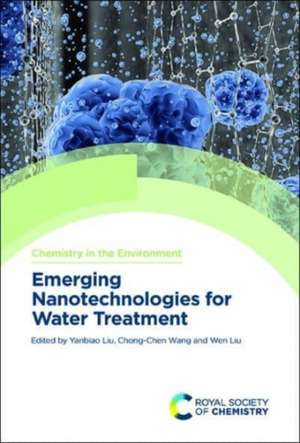Emerging Nanotechnologies for Water Treatment: Chemistry in the Environment
Editat de Yanbiao Liu, Chong-Chen Wang, Wen Liuen Limba Engleză Hardback – 3 noi 2021
Recent advances in emerging environmental nanotechnologies provide promising solutions for these issues. The physical and chemical properties of nanomaterials can be tailored by controlling attributes such as their size, shape, composition, and surface, so that they can be both highly specific and highly efficient. This makes them perfect platforms for a variety of environmental applications including sensing, treatment and remediation.
Providing an array of cutting-edge nanotechnology research in water applications, including sensing, treatment, and remediation, as well as a discussion of progress in the rational design and engineering of nanomaterials for environmental applications, this book is a valuable reference for researchers working in applications for nanotechnology, environmental chemistry and environmental engineering as well as those working in the water treatment industry.
Preț: 1241.94 lei
Preț vechi: 1364.77 lei
-9% Nou
Puncte Express: 1863
Preț estimativ în valută:
237.72€ • 258.30$ • 199.81£
237.72€ • 258.30$ • 199.81£
Carte indisponibilă temporar
Doresc să fiu notificat când acest titlu va fi disponibil:
Se trimite...
Preluare comenzi: 021 569.72.76
Specificații
ISBN-13: 9781839163029
ISBN-10: 183916302X
Pagini: 558
Dimensiuni: 158 x 236 x 36 mm
Greutate: 1 kg
Editura: RSC Publishing
Seria Chemistry in the Environment
ISBN-10: 183916302X
Pagini: 558
Dimensiuni: 158 x 236 x 36 mm
Greutate: 1 kg
Editura: RSC Publishing
Seria Chemistry in the Environment
Notă biografică
Dr. Yanbiao Liu is a full professor in Donghua University, China. He received his Ph.D. degree from Shanghai Jiao Tong University, China (2011), and then pursued postdoctoral training at NUS Environmental Research Institute (NERI) of National University of Singapore (NUS, 2012-2016). His research interests are engineering functional nanomaterials for environmental applications
Dr. Chong-Chen Wang is a full professor in Beijing University of Civil Engineering and Architecture. He is the director of Beijing Key Laboratory of Functional Materials for Building Structure and Environment Remediation. He received his Ph.D. degree from Beijing University of Chemical Technology (2012), and then pursued the postdoctoral training at Beijing University Of Technology (2012-2015). His research interests are rational design and environmental applications of metal-organic frameworks and their composites.
Dr. Wen Liu is a full professor in Peking University (PKU), China. He is the vice-director of Department of Environmental Engineering and the head of Environmental Nanotechnology Lab (ENL) in PKU. He received his Ph.D. degree from Peking University (2014), and then pursued the postdoctoral training at Auburn University (2014-2016) and Georgia Institute of Technology (2016-2017) in USA. His research interests are environmental nanotechnology and environmental functional materials.
Dr. Chong-Chen Wang is a full professor in Beijing University of Civil Engineering and Architecture. He is the director of Beijing Key Laboratory of Functional Materials for Building Structure and Environment Remediation. He received his Ph.D. degree from Beijing University of Chemical Technology (2012), and then pursued the postdoctoral training at Beijing University Of Technology (2012-2015). His research interests are rational design and environmental applications of metal-organic frameworks and their composites.
Dr. Wen Liu is a full professor in Peking University (PKU), China. He is the vice-director of Department of Environmental Engineering and the head of Environmental Nanotechnology Lab (ENL) in PKU. He received his Ph.D. degree from Peking University (2014), and then pursued the postdoctoral training at Auburn University (2014-2016) and Georgia Institute of Technology (2016-2017) in USA. His research interests are environmental nanotechnology and environmental functional materials.
Descriere
Covering recent nanotechnology research in water applications, including sensing, treatment, and remediation, as well as a discussion of progress in the design and engineering of nanomaterials for environmental applications, this book is a valuable reference for those researching nanotechnology and environmental chemistry and engineering.









